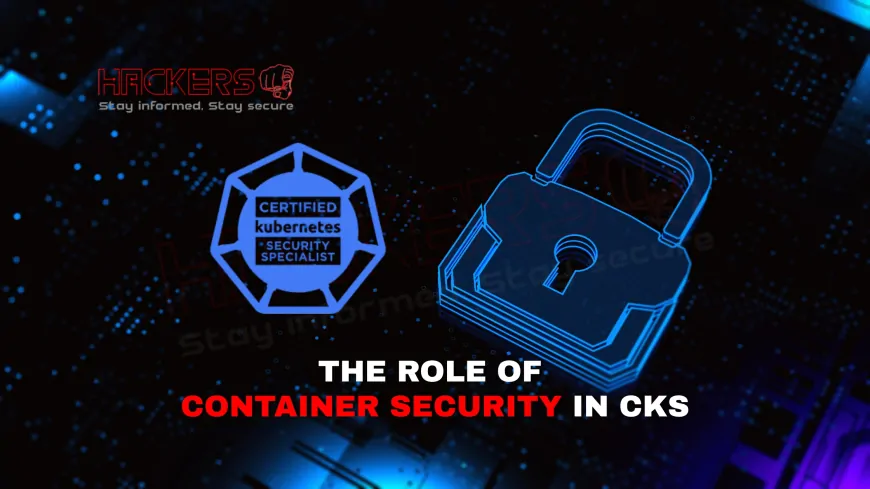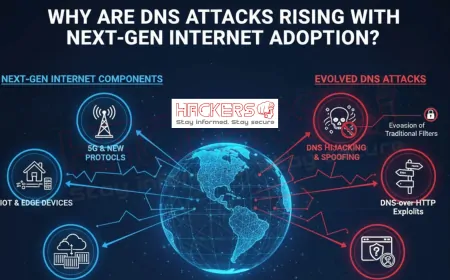The Importance of Container Security in the CKS Course
Containers have revolutionized the way we develop, deploy, and manage applications. They’re lightweight, portable, and allow developers to package applications with their dependencies, ensuring consistency across different environments. But with great power comes great responsibility—securing these containers is critical to protecting modern cloud-native applications. This is where the Certified Kubernetes Security Specialist (CKS) course comes in, offering a deep dive into securing Kubernetes environments, with a strong focus on container security. Whether you’re a DevOps engineer, a security professional, or an IT enthusiast, understanding container security through the CKS course can elevate your skills and help safeguard your organization’s infrastructure. In this blog post, we’ll explore why container security is a cornerstone of the CKS course, break down its key concepts, and explain how mastering these skills can make you a valuable asset in the world of cloud-native technologies. Let’s dive in!

Table of Contents
- Why Container Security Matters
- Overview of the CKS Course
- Key Container Security Concepts in the CKS Course
- Tools and Techniques for Container Security
- Real-World Applications of CKS Skills
- Challenges in Container Security
- Benefits of Mastering Container Security
- Conclusion
- Frequently Asked Questions
Why Container Security Matters
Containers, powered by technologies like Docker and Kubernetes, are the backbone of modern application deployment. They allow developers to package applications with everything they need to run, from libraries to configuration files. However, this flexibility introduces unique security challenges. Containers often run in shared environments, and a single vulnerability can compromise an entire cluster. For example, a misconfigured container could expose sensitive data or allow attackers to escalate privileges within a Kubernetes cluster.
The CKS course addresses these risks by teaching you how to secure containers at every stage of their lifecycle—from building and deploying to runtime. It emphasizes best practices like minimizing container attack surfaces, securing container images, and enforcing runtime policies. With cyberattacks becoming more sophisticated, mastering container security is no longer optional—it’s a necessity for anyone working with Kubernetes.
Overview of the CKS Course
The Certified Kubernetes Security Specialist (CKS) certification, offered by the Cloud Native Computing Foundation (CNCF), is designed for professionals who want to demonstrate their expertise in securing Kubernetes clusters. It builds on the Certified Kubernetes Administrator (CKA) certification, focusing specifically on security aspects like cluster hardening, container security, and incident response.
The CKS course covers a wide range of topics, including:
- Securing container images and registries
- Configuring Kubernetes Role-Based Access Control (RBAC)
- Implementing network policies
- Monitoring and auditing Kubernetes clusters
- Managing runtime security with tools like AppArmor and Seccomp
The course is hands-on, with a performance-based exam that tests your ability to solve real-world security problems in a Kubernetes environment. Container security is a core focus, as containers are the building blocks of Kubernetes applications.
Key Container Security Concepts in the CKS Course
The CKS course dives deep into container security, teaching you how to protect containers from vulnerabilities and misconfigurations. Here are some of the key concepts covered:
- Container Image Security: Ensuring container images are free from vulnerabilities by scanning them with tools like Trivy or Clair.
- Least Privilege Principle: Running containers with minimal permissions to reduce the risk of privilege escalation.
- Immutable Containers: Designing containers to be immutable, meaning they can’t be modified at runtime, reducing the risk of tampering.
- Runtime Security: Using tools like Falco to monitor and detect suspicious activity in running containers.
- Secure Supply Chain: Verifying the integrity of container images from build to deployment, using techniques like image signing.
These concepts are reinforced through practical labs, where you’ll configure security settings, scan images, and respond to simulated attacks.
Tools and Techniques for Container Security
The CKS course introduces you to a variety of tools and techniques to secure containers. Below is a table summarizing some of the key tools you’ll encounter:
| Tool | Purpose | Example Use Case |
|---|---|---|
| Trivy | Scans container images for vulnerabilities | Scanning a Docker image before deployment |
| Falco | Monitors runtime behavior of containers | Detecting unauthorized file access in a container |
| AppArmor | Enforces security profiles for containers | Restricting a container’s access to system resources |
| Seccomp | Filters system calls made by containers | Preventing a container from executing dangerous syscalls |
| Podman | Runs containers without a root daemon | Running containers securely in a rootless environment |
These tools, combined with Kubernetes-native features like network policies and RBAC, form a robust defense against container-related threats.
Real-World Applications of CKS Skills
The skills you gain from the CKS course are directly applicable to real-world scenarios. For example:
- Securing Microservices: In a microservices architecture, each service runs in its own container. CKS skills help you secure these services by implementing network policies and runtime monitoring.
- Compliance: Many industries, like finance and healthcare, have strict compliance requirements. The CKS course teaches you how to configure Kubernetes to meet standards like GDPR or PCI-DSS.
- Incident Response: If a container is compromised, you’ll learn how to detect, isolate, and mitigate the issue using tools like Falco and Kubernetes audit logs.
By mastering these skills, you can contribute to building secure, scalable, and compliant cloud-native applications.
Challenges in Container Security
Container security is not without its challenges. Some common issues include:
- Misconfigurations: Incorrectly configured containers or Kubernetes resources can expose vulnerabilities.
- Image Vulnerabilities: Using outdated or unverified container images can introduce security risks.
- Runtime Threats: Malicious processes running inside containers can be hard to detect without proper monitoring.
- Complexity: Kubernetes environments are complex, and securing them requires expertise in multiple areas, from networking to storage.
The CKS course equips you with the knowledge and tools to address these challenges effectively, ensuring your containers and clusters remain secure.
Benefits of Mastering Container Security
Investing time in the CKS course offers numerous benefits, including:
- Career Advancement: The demand for Kubernetes security experts is growing, and CKS certification can set you apart in the job market.
- Improved Security Posture: By applying CKS skills, you can reduce the risk of breaches and protect sensitive data.
- Confidence in Kubernetes: Understanding container security gives you the confidence to manage complex Kubernetes environments.
- Community Recognition: Earning the CKS certification demonstrates your expertise to peers and employers in the cloud-native community.
Conclusion
Container security is a critical aspect of modern cloud-native development, and the CKS course provides a comprehensive framework for mastering it. From securing container images to implementing runtime protections, the course equips you with the skills to protect Kubernetes environments from evolving threats. By learning tools like Trivy, Falco, and AppArmor, and applying best practices like least privilege and immutable containers, you can build secure, resilient applications. Whether you’re aiming to advance your career or strengthen your organization’s security posture, the CKS course is a valuable investment. Start your journey today and become a Kubernetes security expert!
Frequently Asked Questions
What is the CKS course?
The Certified Kubernetes Security Specialist (CKS) course is a certification program by the CNCF that focuses on securing Kubernetes clusters, with an emphasis on container security, RBAC, network policies, and runtime monitoring.
Who should take the CKS course?
DevOps engineers, security professionals, and IT administrators who work with Kubernetes and want to specialize in securing containerized environments.
Is the CKS certification difficult?
The CKS exam is challenging because it’s hands-on and requires practical knowledge of Kubernetes security. However, with proper preparation, it’s achievable.
What is container security?
Container security involves protecting containerized applications from vulnerabilities and threats throughout their lifecycle, from build to runtime.
Why is container security important?
Containers run in shared environments, and a single vulnerability can compromise an entire system, making security critical for safe deployments.
What tools are covered in the CKS course?
Tools like Trivy, Falco, AppArmor, Seccomp, and Podman are covered for scanning, monitoring, and securing containers.
How does the CKS course help with compliance?
It teaches you how to configure Kubernetes to meet industry standards like GDPR and PCI-DSS, ensuring compliance in regulated environments.
What is a container image?
A container image is a lightweight, portable package that includes an application and its dependencies, used to create containers.
How can I secure container images?
Scan images for vulnerabilities using tools like Trivy, use trusted registries, and sign images to verify their integrity.
What is runtime security?
Runtime security involves monitoring and protecting containers while they’re running, using tools like Falco to detect suspicious activity.
What is the least privilege principle?
It means giving containers only the permissions they need to function, reducing the risk of privilege escalation if compromised.
What are immutable containers?
Immutable containers are designed to be unchangeable at runtime, preventing unauthorized modifications and improving security.
How does the CKS course prepare you for real-world scenarios?
It provides hands-on labs and practical exercises that simulate real-world security challenges, like securing microservices or responding to incidents.
What is RBAC in Kubernetes?
Role-Based Access Control (RBAC) is a method of managing access to Kubernetes resources based on user roles and permissions.
Can beginners take the CKS course?
Beginners can take it, but it’s recommended to have prior Kubernetes knowledge, such as from the CKA certification, for better understanding.
How long does it take to prepare for the CKS exam?
Preparation time varies, but most candidates spend 2–3 months studying, depending on their prior Kubernetes experience.
What is the role of network policies in container security?
Network policies control traffic between containers, pods, and external services, reducing the risk of unauthorized access.
Is the CKS certification worth it?
Yes, it’s highly valued in the industry, as it demonstrates expertise in securing Kubernetes, a critical skill for cloud-native roles.
How does Falco help with container security?
Falco monitors container runtime behavior and alerts you to suspicious activities, like unauthorized file access or network connections.
Can I take the CKS exam online?
Yes, the CKS exam is proctored online, allowing you to take it from anywhere with a stable internet connection.
What's Your Reaction?










































































